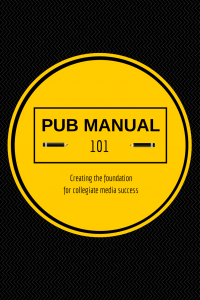This is the third post in a series intended to help you draft or improve your student media staff’s publications manual. Posts in this series will run on Wednesdays throughout the summer. The posts’ titles will start with “Pub Manual 101″ and include the Pub Manual 101 logo.
What is your student media staff’s overwhelming purpose? It’s easy to respond that you’re there to tell the news that happens on campus, but that really isn’t specific enough to unite your staff in a common goal.
If your student media staff doesn’t have a mission statement, you should use writing your publication manual as an opportunity to write one. If you already have a mission statement, now might be a good time to review it and make sure it’s still relevant.
 Advisers, please don’t form your mission statement on your own. A mission statement is not what the adviser thinks is student media’s purpose. Instead, it’s about what the student media staff sees as their purpose.
Advisers, please don’t form your mission statement on your own. A mission statement is not what the adviser thinks is student media’s purpose. Instead, it’s about what the student media staff sees as their purpose.
The mission statement should resonate with all of you and serve as a guide for all of the decisions you make as a staff.
My advice to advisers is to informally poll or discuss with your top editors (and perhaps even administrators, depending on your situation) what they see as the overall purpose of your publications, draft a mission statement based on their responses, then ask them to alter it and approve it.
There are three parts to a good publication mission statement, which can be arrived at by answering these questions:
- Who is your audience?
- What do they need?
- How do your publications fulfill that need?
Spend some time on your mission statement so it will serve you long term. It need not be elaborate. In fact, it’s better if it’s easy to understand and apply.
To help get your started, here is our mission statement:
The purpose of Oklahoma City University’s Student Publications is to inform, entertain and serve the Oklahoma City University community. The community includes the university’s student body, faculty, staff, trustees, alumni, and administrators.
Although Student Publications serve a broad community, the publications’ primary focus is Oklahoma City University’s student body. Student publications not only inform, entertain and serve the students, but also serve as the students’ printed voices. This is done while maintaining the university’s focus on a liberal arts education rooted in the United Methodist tradition of servant leadership.
The publications fulfill the above missions through accurate, ethical and objective reporting of campus- and community-related events. Coverage is facilitated by members of a student editorial board and overseen by a faculty adviser.
While fulfilling the above missions, the publications provide students with realistic, hands-on journalistic training by offering jobs including those related to reporting, production, design, sales, and management to students in any major.”
Our mission statement was written by the student editor-in-chief for our first Pub Manual, which was formed in Fall 2004. It is a bit longer than I personally would have written, but staffs focus on the part I have in bold. The mission statement has served many staffs and they seem to agree that it helps guide them.
Let’s Talk Nerdy!
What questions do you have about writing a mission statement? Would you like to share yours with us?



Leave a Reply